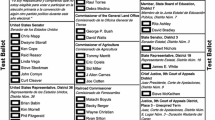Abstract
Using quantitative methods, this article seeks to explore the electoral fortunes of black high-profile statewide candidates in the South. In doing so, we examine both the correlation between vote support for black candidates across counties, as well as the relationship between voter support and the influence of candidate characteristics, such as political apprenticeship, party support, money, incumbency, and media endorsement on electoral support. Although we find that there is a core of white voters who will vote against a black gubernatorial or US Senatorial candidate no matter the circumstance, several unexpected and interesting developments emerge that have profound consequences for the election of future Southern black high-profile statewide hopefuls.






Similar content being viewed by others
Notes
The words black and African American are used interchangeably according to sound and context.
Deval Patrick was re-elected governor of Massachusetts in 2010.
One reviewer of this article questioned why the authors did not examine the 2006 US Senate race in Tennessee. The answer is simple: (1) because the sample was randomly selected and (2) even if that particular election had been selected, it is so obvious that race-baiting on the part of the Republican candidate impacted some white voters who could not stand the thought of Congressman Ford partying with white women at the Playboy mansion that any examination of that race would have undoubtedly revealed what most students of politics already know. The Republicans unleashed an ad that featured a scantily clad white woman telling the viewer how she’d meet Ford at a party at the Playboy’s mansion. At the end of the ad, the woman winks at the camera and tells Ford to give her a call. This ad raised latent fears among southern whites who were probably not entirely comfortable with the thought of a Black U.S. Senator representing their state. It has often been said, that the greatest fear of many southern whites is the dating of a white woman by a Black man.
Alan Keyes also lost a US Senate election in Illinois in 2004.
References
Ansolabehere, S., Lessem, R., & Snyder, J. (2006). The orientation of newspaper endorsements in U.S. Elections, 1940–2002. Quarterly Journal of Political Science, 1, 393–404.
Bullock, C. S. (1998). Georgia: Election rules and partisan conflict. In C. S. Bullock III & M. J. Rozell (Eds.), The new politics of the old south: An introduction to southern politics (pp. 49–65). Lanham: Rowman & Littlefield.
Clemons, M. L., & Jones, C. E. (1997). The wilder vote and the new south phenomenon: a multivariate analysis. Review of Black Political Economy, 25, 41–56.
Edds, M. (1987). Free at last: What really happened when civil rights came to Southern Politics. Bethesda: Adler & Adler.
Jeffries, J. L. (1999). U.S. Senator Edward W. Brooke and Governor L. Douglas Wilder tell political scientists how Blacks can win high-profile statewide office. Political Science & Politics, XXXII, 583–587.
Jones, C. E. (1991). The election of L. Douglas Wilder: the first Black lieutenant governor of Virginia. The Western Journal of Black Studies, 15, 105–113.
Jones, C. E., & Clemons, M. L. (1993). A model of racial crossover voting: an assessment of the Wilder victory. In G. Persons (Ed.), Dilemmas of Black politics (pp. 128–147). New York: Harper-Collins.
Key, V. O. (1949). Southern Politics in State and Nation. New York: Knopf [new edition, 1977].
Patterson, T. (1989). The press and candidates’ images. International Journal of Public Opinion Research, 1, 123–135.
Patterson, T. (1993). Out of order. New York: Alfred Knopf.
Pitkin, H. F. (1967). The concept of representation. Berkeley: University of California Press.
Sonenshein, R. J. (1990). Can Black candidates win statewide elections? Political Science Quarterly, 105, 219–241.
St. Dizier, B. (1985). The effect of newspaper endorsements and party identification on voting choice. Journalism Quarterly, 62, 589–594.
Strickland, R. A., & Whicker, M. (1992). Comparing the Wilder and Gantt campaigns: a model for Black statewide success in statewide elections. Political Science & Politics, 25, 204–212.
Thernstrom, A. M. (1987). Whose votes count? Affirmative action and minority voting rights. Cambridge: Harvard University Press.
Wattenberg, M. (1984). The decline of American parties, 1952–1984. Cambridge: Harvard University Press.
Wilhite, A., & Theilman, J. (1986). Women, Blacks and PAC discrimination. Social Science Quarterly, 67, 283–298.
Williams, L. F. (1989). White/Black perceptions of the electability of Black political candidates. National Political Science Review, 1, 45–64.
Author information
Authors and Affiliations
Corresponding author
Additional information
The term High-Profile Statewide Office was coined by the first author 15 years ago to describe the offices of governor and US Senate.
Rights and permissions
About this article
Cite this article
Jeffries, J.L., Wavro, M.A. Can African Americans Win High-Profile Statewide Offices in the South? A Study in Southern Inhospitality. J Afr Am St 15, 415–432 (2011). https://doi.org/10.1007/s12111-010-9152-z
Published:
Issue Date:
DOI: https://doi.org/10.1007/s12111-010-9152-z




